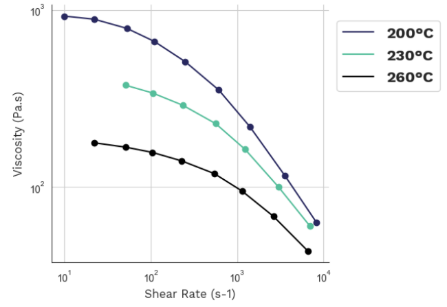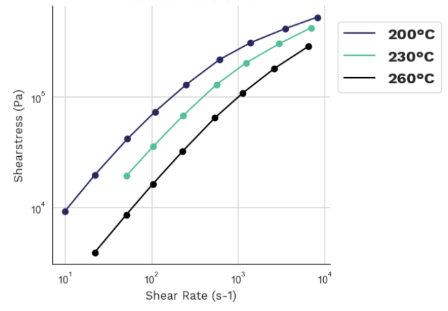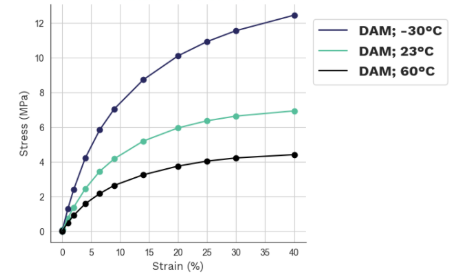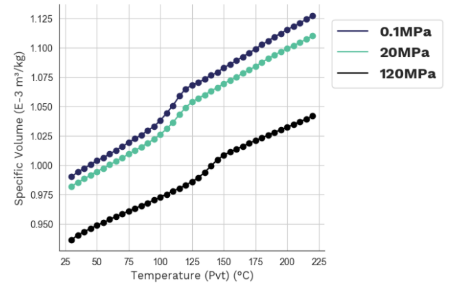Enhanced TDS
Identification & Functionality
- Additives Included
- Blend
- Yes
- Chemical Family
- Polymer Name
- Product Code
- MITM16541
- Single Ingredient
- No
- Technologies
- Product Families
Features & Benefits
- Labeling Claims
- Materials Features
Applications & Uses
- Plastics & Elastomers End Uses
- Plastics & Elastomers Processing Methods
- Processing Information
- Typical melt temperature (Min / Recommended / Max) - Injection Molding: 210°C / 240°C / 270°C (410°F / 430°F / 520°F)
- Typical mold temperature - Injection molding: 10 - 30°C (50 - 90°F)
- Drying time and temperature: 60 - 70°C (140 - 160°F) / 4 - 8 hours
- Technical Data
VIscosity-shear rate Pebax@ 4533 SP 01

Shear stress-shear rate Pebax@ 4533 SP 01

Shear stress Pebax@ 4533 SP 01

Specific volume-temperature (pvT) Pebax@ 4533 SP 01

Properties
- Physical Form
Principal Information
- Group Principal Number
- S000003
- Principal
Storage & Handling
- Storage Information
Two years from the date of delivery, when stored properly (sealed bags, appropriate moisture, UV protection and temperature).
Other
- Color (SDS)
- Colorless
- Insoluble in (SDS)
- Water
- Odor (SDS)
- Odorless
- Other Hazards
- Handle in accordance with good industrial hygiene and safety practice. (pellets/granules) This product may release fume and/or vapor of variable composition depending on processing time and temperature.
- Temperature Control
- Yes
- USA/DOT UN Number
- Not Applicable
- Electrical Properties
Value Units Test Method / Conditions Comparative Tracking Index 600.0 - IEC 60112 at 23°C, conditioned Dielectric Constant 9.0 - at 100Hz, conditioned Dielectric Constant 6.0 - at 1MHz, conditioned Dielectric Constant 43.0 - IEC 60243-1 at 23°C, conditioned Dissipation Factor 2090.0 tan δ tan δ at 100Hz, conditionned Dissipation Factor 2090.0 tan δ tan δ at 1Mhz, conditionned Surface Resistivity 3000000000000.0 Ω/sq Ω/sq IEC 62631-3-2 at 23°C, conditioned Volume Resistivity 160000000000.0 Ω-m Ω-m IEC 62631-3-1 at 23°C, conditioned, transversal - Mechanical Properties
Value Units Test Method / Conditions Compression Set 37.0 % % ISO 815 dry basis Flexural Modulus 86.0 MPa MPa ISO 178 at 23°C, conditioned Hardness 90.0 Shore A Shore A ISO 868 at 15s, conditioned Nominal Strain at Break min. 550.0 % % ISO 527-1 at 23°C, 50 mm/min, 10°C/min, conditioned Nominal Strain at Break min. 550.0 % % ISO 527-1 at 23°C, 50 mm/min, 10°C/min, dry Nominal Strain at Break min. 550.0 % % ISO 527-2 at 23°C, 50 mm/min, 10°C/min, conditioned Nominal Strain at Break min. 550.0 % % ISO 527-2 at 23°C, 50 mm/min, 10°C/min, dry Stress 9.0 MPa MPa ISO 527-1 at 23°C, 50 mm/min, conditioned 50% strain Stress 9.0 MPa MPa ISO 527-1 at 23°C, 50 mm/min, dry, 50% strain Stress 9.0 MPa MPa ISO 527-2 at 23°C, 50 mm/min, conditioned 50% strain Stress 9.0 MPa MPa ISO 527-2 at 23°C, 50 mm/min, dry, 50% strain Stress at Break 42.0 MPa MPa ISO 527-1 at 23°C, 50 mm/min, conditioned Stress at Break 42.0 MPa MPa ISO 527-2 at 23°C, 50 mm/min, conditioned Tensile Modulus 81.0 MPa MPa ISO 527-1 at 23°C, 1 mm/min, conditioned Tensile Modulus 88.0 MPa MPa ISO 527-1 at 23°C, 1 mm/min, dry Tensile Modulus 81.0 MPa MPa ISO 527-2 at 23°C, 1 mm/min, conditioned Tensile Modulus 88.0 MPa MPa ISO 527-2 at 23°C, 1 mm/min, dry - Physical Properties
Value Units Test Method / Conditions Glass Transition Temperature (Tg) -55.0 °C °C ISO 11357-1 at 10°C/min Melting Point 147.0 °C °C ISO 11357-1 at 10°C/min Shrinkage 1.1 % % ISO 294-4 Normal (t+24h) Shrinkage 0.6 % % ISO 294-4 Parallel (t+24h) Specific Gravity 1.01 - ISO 1183-1 at 23°C Storage Temperature max. 140.0 °F °F Water Absorption 0.4 % % ISO 62 at 23°C, 50%HR, equilibrium Water Absorption 1.2 % % ISO 62 at 23°C, immersion, equilibrium - SDS Physical and Chemical Properties
Value Units Test Method / Conditions Autoignition Temperature (SDS) 698.0-842.0 °F °F ASTM D1929 Bulk Density (SDS) 550.0-650.0 kg/m³ kg/m³ Decomposition Temperature (SDS) 572.0-842.0 °F °F - Shelf Life & Stability
Value Units Test Method / Conditions Shelf Life 2.0 yr yr - Thermal Properties
Value Units Test Method / Conditions Heat Deflection Temperature 52.0 °C °C ISO 75-1 at 0.45 MPa
